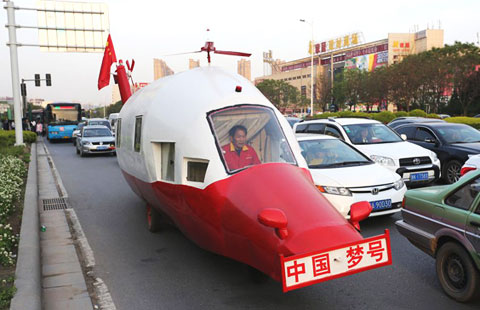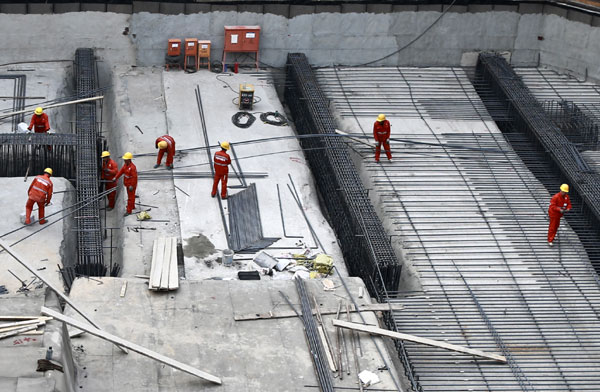Beijing seeks new private investment to expand subway
Updated: 2015-04-23 14:31
By Zheng Jinran(China Daily)
|
||||||||
Move comes after construction costs soar in past few years
Beijing plans to attract more nongovernment funds to fuel the rapid expansion of the subway network, the company responsible for providing finance and planning new projects has revealed.
Construction costs have almost doubled in the past six years, the Beijing Infrastructure Investment Co said.
The technical and economic performance index, which reflects construction costs, increased to 1 billion yuan ($161 million) per kilometer in 2014 for subway lines in the downtown area, according to figures released by the company. The corresponding figure in 2007 was 571 million yuan.
The municipal government has annual allocations to fund subway construction projects, and these reached 15.5 billion yuan in 2014.
Most of the money is provided by the company, which has invested more than 251.3 billion yuan in the network in recent years - enough to build 110 Bird's Nest stadiums or 246 Water Cube aquatics centers.
Now the capital's municipal government has released a guideline designed to attract more funds from private sources to finance large public projects, including the subway.
Yang Xuhui, an official at the Beijing Municipal Commission of Development and Reform, the city's top economic planner, said companies can invest either alone or as a part of a consortium.
"More than one company has shown an interest," he added.
Beijing was the first city on the Chinese mainland to build a metro system, and there are now 18 lines covering a total distance of 527 kilometers. The total is scheduled to reach around 1,000 kilometers by 2020 to meet the huge demand from the capital's population of more than 21 million. The expansion should ease traffic congestion and reduce air pollution.
The cost of materials, labor, machinery and land acquisition and resettlement has also continued to rise, and this has pushed up the amount of investment needed, the company said.
Metro construction projects in other cities have also been affected by rising costs. It is estimated that at least 3 trillion yuan will be invested nationwide in networks that will cover a total distance of 6,000 kilometers by 2020, official Li Guoyong told China Business Times. Li works in the infrastructure projects section of the National Development and Reform Commission, the country's top economic planning agency.
There are currently two companies involved in running the capital's network - city-owned Beijing Mass Transit Railway Operation Corp, and Beijing MTR Corp, a public-private joint venture with Hong Kong's MTR.
On Feb 8, Beijing MTR Corp paid 15 billion yuan for the right to operate Line 16 for 30 years. It already runs Line 4 and Line 14.
Safety is a major concern both during the construction process and after new lines open.
Le Guiping, a spokesman for Beijing MTR Construction Administration, which is in charge of building the company's projects, said: "We have a safety and emergency command center that monitors the whole process from construction of the facilities to test runs."
The center came into operation in January.
A second monitoring center is designed to ensure that lines operate safely. This supplies information about passenger flows and other data to the government to help it reach decisions on the future development of the network.
zhengjinran@chinadaily.com.cn
|
A construction team works on the second phase of Beijing's Changping Line on Thursday. The line is expected to open at the end of the year. Feng Yongbin / China Daily |
(China Daily USA 04/23/2015 page6)

 Chinese real estate deals in US topical forum
Chinese real estate deals in US topical forum
 Weird stuff you can buy on Taobao
Weird stuff you can buy on Taobao
 Top 5 wealthiest women in world's tech sector
Top 5 wealthiest women in world's tech sector
 Outsiders challenge traditional smartphone makers
Outsiders challenge traditional smartphone makers
 Helicopter replica on the road
Helicopter replica on the road
 Singing Chinese language's praises
Singing Chinese language's praises
 Foreign girls join in ancient Chinese coming-of-age ritual
Foreign girls join in ancient Chinese coming-of-age ritual
 Shanghai auto show kicks off
Shanghai auto show kicks off
Most Viewed
Editor's Picks

|

|

|

|

|

|
Today's Top News
China sustains US cities: Bloomberg
Real estate investors may switch focus: panel
Obama submits nuclear energy cooperation deal with China
US urges Japan to handle wartime history in constructive way
Mexico bans poultry, egg imports from bird flu-hit Iowa
Bloomberg: Chinese investment sustains US cities
China, Pakistan elevate ties, commit to long-lasting friendship
'Belt-Road' to exchange goodwill with economic coopertation
US Weekly

|

|






